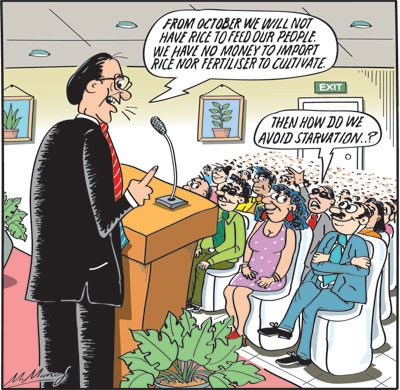Columns
Responding to the imminent food shortages and starvation
View(s): The prospect of severe food shortages, malnutrition and even starvation later this year is frightening. How do we respond to, and cope with, the imminent food shortages and starvation? Can we avoid the specter of hunger and starvation?
The prospect of severe food shortages, malnutrition and even starvation later this year is frightening. How do we respond to, and cope with, the imminent food shortages and starvation? Can we avoid the specter of hunger and starvation?
Policies
This dire situation is now recognised by the government that brought about this situation. Several policy initiatives are being envisaged and some are being implemented to enhance food production.
Food situation
The country’s food security at the national level, as well as of low income households, is under threat. The core problem is that the quantity of food available in the country, by domestic production and imports, is inadequate.
And the capacity of the country to import the food deficit is hampered by the paucity of foreign currency, rising international prices, shortages of international food stocks, and the banning of food exports by food-exporting countries.
Food production
This dire food situation, could be alleviated only by increased food production. This is difficult owing to the lack of fertiliser, agrochemicals, kerosene and diesel, that are needed.
Moreover, the cost and unavailability of fertiliser make import of fertiliser that is crucial for agriculture difficult, if not impossible. However, in these conditions increasing food production even at low productivity levels is rational.
Strategies
The impending food security problem requires to be mitigated by a two-pronged strategy of reducing consumption, on the one hand, and increasing production, on the other.
Consume less
In this situation of food scarcity there is a need to conserve food by reducing consumption, especially of the staple, rice. Food wastage is unpardonable.
Social responsibility
A social consciousness on the need to contain consumption of food must be reinforced by a sense of social responsibility, especially among the affluent. Households as well as hotels and restaurants could devise ways of reducing wastage of food. Pricing policies and regulations, especially at hotels, may be needed to curb excessive consumption and waste.
Food production
The government has adopted a multipronged strategy to increase food production. These include the diversification of crops, cultivation of uncultivated lands, growing of short term food crops requiring minimum space and intensive cultivation of food crops in home gardens.
Uncultivated lands
Uncultivated plots of land on estates, government properties and schools are to be cultivated with food crops. Such cultivation that may be uneconomic under normal conditions, is a rational utilisation of land in the current conditions. On the other hand, intensive cultivation of small plots with household compost can often be highly productive and could enhance household nutrition.
Fisheries
The resuscitation of sea fishing that has been hampered by a lack of kerosene and diesel is critically important. The government must give priority to providing fuel for fisheries. Fish could provide valuable protein and enhance nutrition.
Community intervention
Even with these efforts to increase food production, there would be a significant proportion of the population unable to access even a minimum amount of food. These persons have to be retrieved from hunger and starvation by government intervention. In the government’s current financial bind, food shortages and difficulties of reaching the really needy, the deprivation of food to the poorest segment of population is likely.
Community initiatives
In this situation, socially responsible corporates and community organisations have begun programmes to feed the starving poor. The expansion of such efforts are vital to minimise the impending hunger and starvation.
Recapitulation
A severe food crisis later this year is inevitable. Its impact on low-income households could be horrible. Malnutrition, hunger, and starvation are likely but not inevitable. Despite several constraints, ways and means have to be found to increase domestic food production. Uncultivated marginal lands of low potential yield have to be cultivated. Home gardens with easily cultivated nutritional crops would be invaluable to household food and nutrition.
Fishing
The resuscitation of sea fishing that has been hampered by lack of kerosene and diesel is imperative. Increased fish production could provide valuable nutrition.
Excessive consumption
These strategies of increasing food production have to be complimented by efforts to contain excessive consumption and waste. Moral suasion, a sense of social responsibility and some regulations could reduce excessive consumption and the wastage of food in this situation of a food shortage.
Poorest
Even with these efforts to increase food production, there would be significant proportion of the population unable to access even a minimum amount of food. These persons have to be retrieved from hunger and starvation by government intervention.
In the financial bind government is in, the food shortages and difficulties of reaching the really needy, the poorest are likely to be deprived of food. Socially responsible corporate bodies, chambers of trade and commerce and community initiatives have begun programmes to feed the starving poor. The expansion of such efforts are vital to minimise hunger and starvation.
Conclusion
The food shortage later this year is inevitable. Its difficulties and consequences have to be mitigated by increased food production, reduced food consumption, state and community interventions and international assistance.
What cannot be averted has to be endured and mitigated.
Buying or selling electronics has never been easier with the help of Hitad.lk! We, at Hitad.lk, hear your needs and endeavour to provide you with the perfect listings of electronics; because we have listings for nearly anything! Search for your favourite electronic items for sale on Hitad.lk today!


Leave a Reply
Post Comment